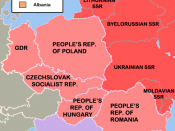Between 1946 and 1961, the relationship between western and eastern Europe deteriorated significantly in the context of the Cold War. Three major events will be discussed: Churchill's Iron Curtain Speech, the Berlin Blockade, and the Berlin Wall.
Churchill's Iron Curtain Speech in 1946, calling for an alliance between English-speaking countries, seemed to predetermine a worsening European situation. By 1945, the USSR already controlled Albania and Bulgaria; in the following four years five more countries would fall under Soviet rule, the majority through Salami tactics: forming coalitions and then taking over the government by presenting charges against them. By 1949, West Germany had been formed, and an invisible barrier did seem to exist between eastern and western Europe.
The post-war economic situation deepened divisions between the countries of Europe. The US in 1947 began the Marshall Plan, a $13 billion investment to assist the weakened economies of Europe. Stalin opposed the plan and forbade the eastern European countries to sign up for Marshall aid. He set up Cominform in the same year to coordinate the economies of eastern Europe. The east, under Stalin's rule, was plundered for resources, for he was more interested in establishing buffer states than helping the countries recover. Western Europe prospered and the eastern nations remained poor. This was the most apparent in Berlin - Western Berlin became prosperous and the East had relatively low living standards. Faced with the potential destabilizing of German money due to the West wanting to introduce the deutchmark, Stalin started the Berlin Blockade in June 1948. This conflict was the first direct confrontation not only between the US and USSR, but for east and western Europe also. It resulted in increased tension and the creation of separate German states, the Federal Democratic Republic and the German Democratic Republic,


